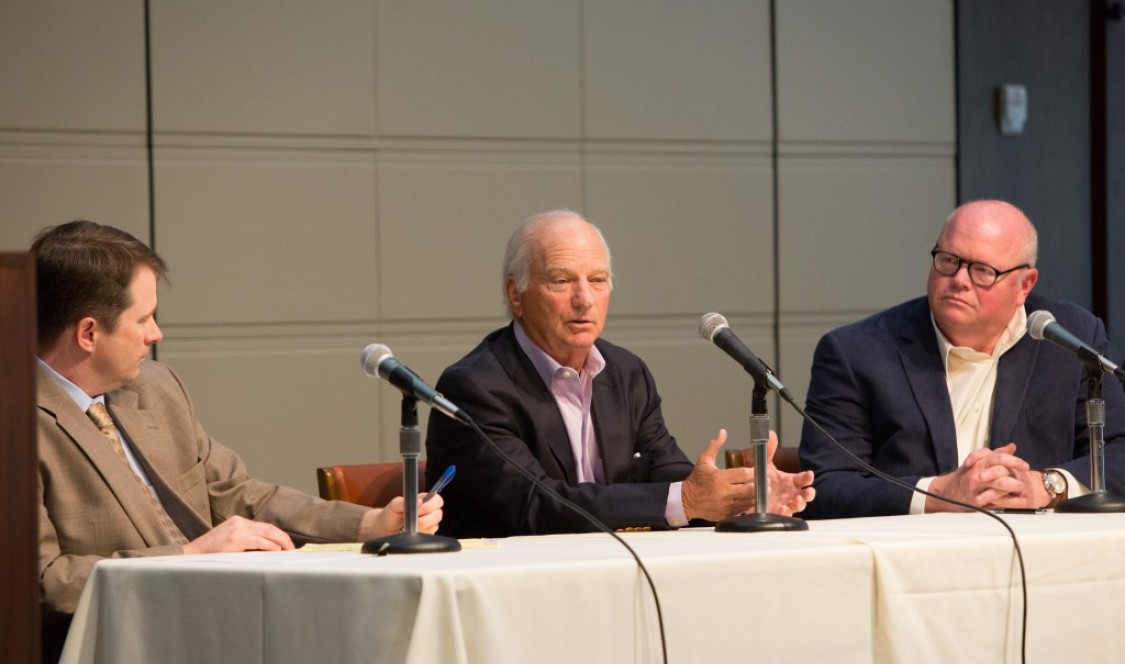There’s an old axiom about investing that says always remember to buy low and sell high.
It’s a long (and self-evident) view toward acquiring wealth that would be foolish to deny. Indeed, during an Athenaeum luncheon on April 21 entitled A Conversation on Investing, guest speakers (both investment heavy hitters), George Roberts ’66 P’93 and Britt Harris, agreed but with a slight twist. In Roberts and Harris’ view, it’s better for individual investors to buy low and then wait, wait, wait and then wait some more before selling, maybe.
“Save,” said Harris, CIO for the Teacher Retirement System of Texas (TRS), the sixth largest public pension trust in America and among the 20 largest pension funds in the world. “If you start out saving now, it’s going to be more important than what you invested in. Save and do not overspend. That’s the most important thing for an individual investor. The second thing is we are emotional creatures. The human brain was not designed to invest. The human brain was designed to run away when scared – fright and flight – and to charge in when it seems calm. That’s exactly the opposite of what you have to do when you invest.”
Roberts, co-founder of Kohlberg Kravis and Roberts & Co. L.P. (KKR) in 1976 and the firm’s co-chairman and co-chief executive officer advised lunch attendees only invest “in things you know and never invest all your money at one time.”
He told prospective investors to stay involved and keep track of what is going on. “If you still believe in the thesis with regard to how you first invested in a fund or a stock then buy more of it over time,” he said. “If you aren’t prepared to spend the time and intellectual effort required to personally monitor your investments, then you need to find massive fixed funds and/or securities and just invest in those. And if they go down, buy some more.”
Surveying the crowd largely comprised of students, Roberts said: “Most of you are young and if you can earn seven percent a year and reinvest those dividends, you’ll double your money in 10 years.”
If the keys to the investing kingdom were not exactly handed down at the luncheon, than at least invaluable nuggets of wisdom were imparted that investors (especially young people) could potentially wend into investments with a nice rate of return.
According to Harris, “Most people put very little effort into their investment process and they expect to do very well. That’s not rational.”
Roberts cautioned attendees that business analysis doesn’t trump interpersonal skills. “No matter how much brilliant quantitative analysis you may come up with, what often wins the day are personal – people – skills,” he said. “The two most important things the KKR concerns itself with is how to create value in what we invest in and how to build relationships with people that can help you.
“And remember,” he added “investing is all about people. Human talent is far scarcer than financial capital. And as you move out of the U.S., it becomes even scarcer.”
Roberts went on to say that employees at KKR are evaluated vis-à-vis three major categories: commercial success, how they helped others in the firm and if they as employees “lived” the culture and values of the firm. “Many former employees were very successful commercially, but they are no longer with us,” Roberts said. “They didn’t rate high enough in the other categories.”
As far as tailored advice to student attendees, Harris postulated an interesting scenario. He said that hard work, ambition and technical competence are well and good when embarking on a career, but those competitive attributes that separate achievers from the rest of the pack don’t ensure success long term.
In Harris’ Texas parlance, “If you don’t add extra bullets to your gun belt, then you will be massively confused when you hit your mid-‘30s,” he said. “That extra all-important fourth attribute is the accumulation of wisdom.”
Roberts said that what he finds lacking among many young people he meets is the ability to communicate – a situation he feels has been exacerbated by electronics (texting, tweeting, etc.). “No one picks up the phone anymore, too much, and calls anyone. I keep coming back to this: you cannot build relationships without personal, meaningful communication. Don’t be afraid to ask for help and always build your relationship and networking skills, always.”
Nora Kim ’14 said she was spurred to attend the lunch largely because she is interested in KKR’s commitment to environmental sustainability and their emphasis on socially responsible investing. Shrivats Khaiten ’14 remarked that Roberts’ career in finance is legendary. “This lunch at the Athenaeum has been my only chance at CMC to hear him speak live,” he said.
Roberts earned a B.A. from Claremont McKenna College in 1966 and a J.D. from the University of California (Hastings) Law School in 1969. He has more than four decades of experience financing, analyzing, and investing in public and private companies, as well as serving on the boards of a number of KKR portfolio companies.
Harris has more than 30 years of investment experience leading several of the largest, most successful, and most innovative investment organizations in America. In addition, Harris is currently a member of the (U.S.) President’s Working Group for Financial Markets and serves at the New York Stock Exchange on a sub-committee on pensions.
Darren Filson, associate professor, Robert Day School of Economics and Finance, moderated the discussion.
##

